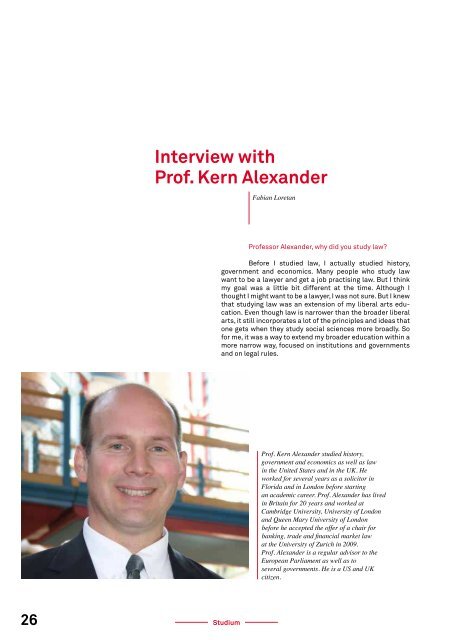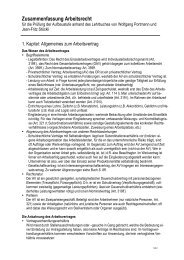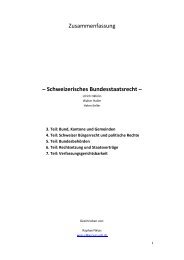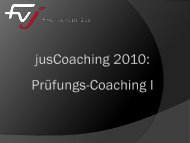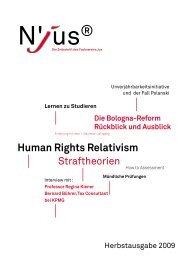Herbstausgabe 2010 - Fachverein Jus | Universität Zürich ...
Herbstausgabe 2010 - Fachverein Jus | Universität Zürich ...
Herbstausgabe 2010 - Fachverein Jus | Universität Zürich ...
Sie wollen auch ein ePaper? Erhöhen Sie die Reichweite Ihrer Titel.
YUMPU macht aus Druck-PDFs automatisch weboptimierte ePaper, die Google liebt.
Interview with<br />
Prof. Kern Alexander<br />
<br />
«For Zurich, recognisably being an<br />
international faculty, it is good to have one<br />
or two professors with a common law<br />
background.»<br />
Professor Alexander, why did you study law?<br />
Before I studied law, I actually studied history,<br />
government and economics. Many people who study law<br />
want to be a lawyer and get a job practising law. But I think<br />
my goal was a little bit different at the time. Although I<br />
thought I might want to be a lawyer, I was not sure. But I knew<br />
that studying law was an extension of my liberal arts education.<br />
Even though law is narrower than the broader liberal<br />
arts, it still incorporates a lot of the principles and ideas that<br />
one gets when they study social sciences more broadly. So<br />
for me, it was a way to extend my broader education within a<br />
more narrow way, focused on institutions and governments<br />
and on legal rules.<br />
<br />
<br />
<br />
<br />
<br />
<br />
<br />
<br />
<br />
<br />
<br />
<br />
<br />
<br />
<br />
<br />
And then you just stayed in the area?<br />
And I stayed in the area, exactly. Like in most things,<br />
inertia sets in. You take a certain path in your career and at<br />
first you might think you are doing it because it looks interesting<br />
and it would be a good life experience. When you get<br />
older you realise that you committed so much of your life to<br />
this that it would cost a lot of change to do something else.<br />
I began the career track by doing a PhD in law and then you<br />
know, one thing leads to another, you become a lecturer and<br />
go through your academic career development.<br />
Can you tell us something about your research<br />
interests?<br />
Broadly, my area of research is financial regulation,<br />
but more specifically I look at the European aspects of financial<br />
regulation and the governance of the EU with respective<br />
financial markets. So I am looking at banking regulation, securities<br />
regulation but also macro economic policy and how<br />
it affects the operation of the European Union and in particular<br />
the euro-zone.<br />
Does Switzerland or Swiss law play a role in this<br />
research?<br />
I think Swiss law is relevant because, geographically,<br />
Switzerland is at the heart of Europe. It has had to<br />
negotiate bilateral agreements with the European Union to<br />
implement a lot of the EU directives in a way that makes<br />
Swiss law similar to EU law. So I think Switzerland is a very<br />
interesting legal system because it does not have to fully do<br />
the whole framework of EU law, but it implements a lot of<br />
the parts of EU law in a very innovative way, which is very interesting<br />
to study from a point of looking at legal innovation.<br />
An example for this is the market abuse directive. It is very<br />
prescriptive; everyone in Europe has got to adopt it in the<br />
way it is written. Switzerland has negotiated its implementation<br />
in a way which is more flexible, so the Swiss can define<br />
market abuse in a way that fits their jurisdiction probably<br />
better than say another EU state that has to implement the<br />
broader EU legislation.<br />
Can you tell us something about your other<br />
professional activities?<br />
I am an advisor to the «European Parliament committee<br />
on economic and monetary affairs». I advise the committee<br />
and I have done several reports for it on the reform of<br />
EU financial regulation, on banking regulation, on the implementation<br />
of Basel III and also on the regulation of capital<br />
markets in light of the financial crisis. I also advised the Parliament<br />
recently on the sovereign debt crisis in the Euro zone<br />
and what to do about the Greek crisis. So I am now working<br />
on sovereign debt issues from a practical policy prospective.<br />
How good is your work-life balance?<br />
I probably do not have as good a work life balance<br />
as I should have. I am married and I think my wife strikes a<br />
much better balance than I do (laughs).<br />
As students decide on a profession, in my opinion, it<br />
is very important to think about the commitments they have<br />
to make in different types of jobs and that family life is very<br />
important. As people grow older, it is easy to neglect family<br />
life or to think it is something that they can do on the side.<br />
But some time, they find out that they missed out on something<br />
that was probably as meaningful or more meaningful<br />
in the long run. So I make a conscious effort to have family<br />
time and to separate that from my work time. And I think all<br />
students should think about that, too. It is easy to disregard<br />
it now, but as you get older, you realise that your life passes<br />
you by pretty quickly!<br />
How are your different appointments split up?<br />
I am a full time professor here in Zurich. I live here<br />
and also in Cambridge where my wife works at University. I<br />
used to work at Cambridge University, too, but not anymore.<br />
Also, I was formerly employed at Queens Mary, University of<br />
London and I still have colleagues there with whom I do research.<br />
As my wife still works there, we have a house there<br />
and I go there quite a bit and work or do research with my<br />
colleagues.<br />
26 Studium Studium<br />
27


